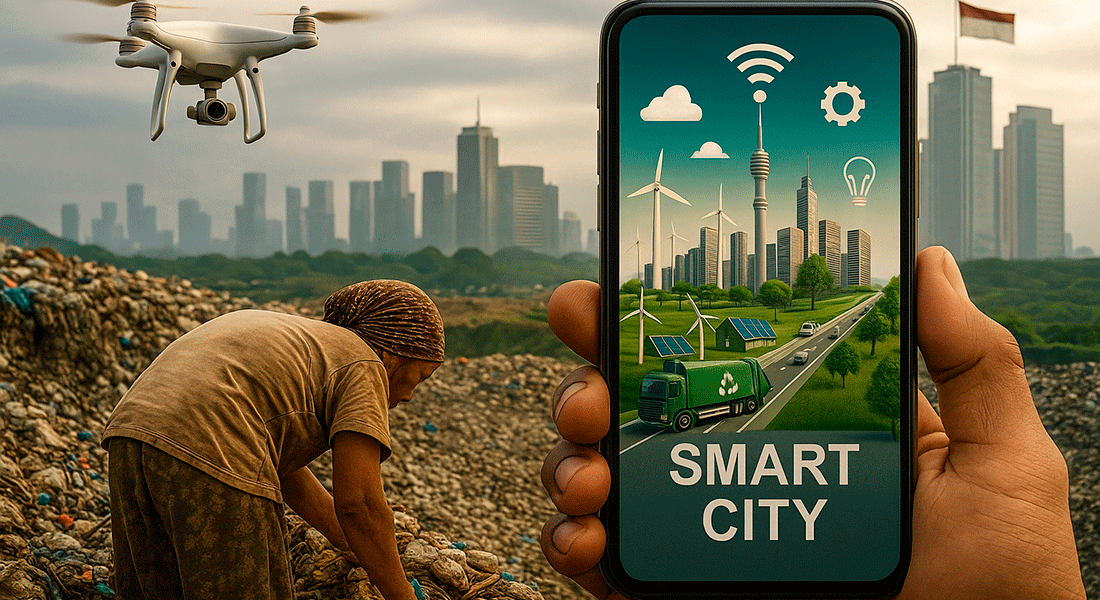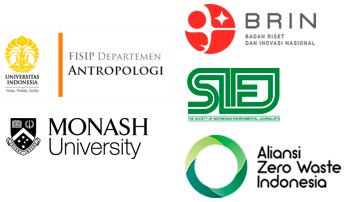Challenges and opportunities of digitalising waste management in Indonesian smart cities (DigSmart)
Through DigSmart we aim to develop recommendations for achieving a socially and environmentally just green transition in Indonesian smart cities through the integration of digital technologies in waste management (WM), guided by systematic analyses of the ambivalent impacts of digitalisation.

In Indonesia, the massive waste-related environmental problems coincide with the rapid proliferation of digital technologies and smart cities. DigSmart’s main approach is to investigate waste management (WM) as part of circular economies and processes of digitalisation and how that fosters or impedes the creation of what we call ‘sustainable smart cities’.
DigSmart is comprised of 4 work packages that
- investigate how the waste crisis, digital technologies and related ambivalences are problematised in green transition discourses;
- study how digital technologies are developed and deployed in the WM sector, and how this contributes to, challenges, or transforms existing WM systems, practices, and knowledge;
- explore the sociocultural, economic, and environmental costs of digital technologies use in WM; and
- enhance capacity building across the WM sector and core research institutions to promote an equitable, inclusive, and environmentally sound circular economy.
What role can the digitalisation of WM play in the development of sustainable smart cities, and under which conditions can it foster a more inclusive, equitable and environmentally just green transition in Indonesia?
WP1 – Digital ambivalences in smart city WM
Detailed understanding of how digital technologies in smart city and WM initiatives are presented, framed and discussed in mainstream media, social media and other digital platforms in Indonesia, incl. government policy documents, grey, academic and civil society organisations’ literature.
WP2 – Infrastructuration
Systematic, in-depth and comparative insights into ongoing processes of WM infrastructure transformations in 4 smart cities, incl. ethnographic accounts of factors enabling and hindering the use of digital technologies across the whole life cycle of solid WM as well as spatial mapping of the available WM facilities.
WP3 – Environmental and socio-economic costs
Comprehensive assessment of the sociocultural, economic, and ecological impacts of digital technology in WM, incl. ethnographic accounts of everyday perceptions and experiences of waste and consumption among urban households and informal waste workers as well as a life cycle assessment of various solid WM strategies enabled and promoted by digital technologies.
WP4 – Capacity building across WM and research
Enhanced capacities among researchers and partners in Indonesia to collaborate (across countries, institutions, disciplines and career statuses), to research, to disseminate DigSmart findings to different audiences, and to design future research, policies and programs for the promotion and implementation of a just green transition.
Researchers
Internal
| Name | Title | Phone | |
|---|---|---|---|
| Bräuchler, Birgit | Associate Professor | +4535331308 | |
| Fort, Lukas | Postdoc | +4535331019 |
External
| Name | Title |
|---|---|
| Ardhianto, Imam | Assistant Professor, Anthropology, Universitas Indonesia |
| Hardiah, Sofiatul | PhD student, Anthropology, Universitas Indonesia |
| Hidayana, Irwan | Associate Professor, Anthropology, Universitas Indonesia |
| Idris, Ika | Associate Professor, Communication Studies, Monash University Indonesia |
| Kusumawardhana, Adryan | PhD Student, Faculty of IT, Monash University Indonesia |
| Lechner, Alex | Vice President Research Monash University Indonesia |
| Noer, Astriany |
PhD Student, Faculty of Art, Design and Architecture, Monash University Indonesia, and Researcher at the Research Center for Sustainable Industrial and Manufacturing System, National Research and Innovation Agency, BRIN, Indonesia
|
| Sasongko, Nugroho Adi | Director Research Center for Sustainable Production Systems and Life Cycle Assessment, National Research and Innovation Agency, BRIN, Indonesia |
| Sudhiastiningsih, Ni Nyoman Sri Natih | PhD student, Anthropology, Universitas Indonesia |
| Wijaya, Derry | Associate Professor, Data Science, Monash University Indonesia |
Funding
Partners







.png)